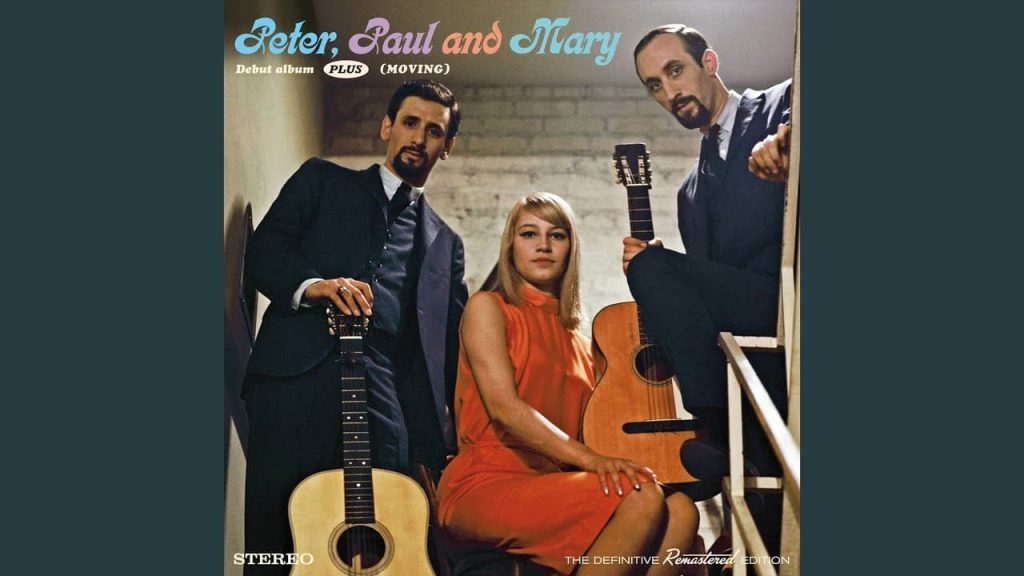
Peter, Paul and Mary – 500 Miles
“500 Miles”, performed by the iconic folk trio Peter, Paul and Mary, is one of the most hauntingly beautiful and enduring folk songs of the 1960s. Originally written by Hedy West, the song became widely known through its poignant rendition by Peter, Paul and Mary in their 1962 self-titled debut album. Though it didn’t become a major chart-topping hit like some of their other songs, such as “Blowin’ in the Wind” or “If I Had a Hammer”, “500 Miles” holds a special place in the folk canon, both for its emotional depth and for the simplicity of its message, which resonates with listeners to this day.
At its core, “500 Miles” is a song about longing, regret, and the feeling of being too far gone to return home. The lyrics tell the story of a traveler who is far from home, penniless, and ashamed, unable to face the people he has left behind. The line, “Lord, I’m one, Lord, I’m two, Lord, I’m three, Lord, I’m four, Lord, I’m five hundred miles away from home,” captures a deep sense of isolation and the emotional burden of being estranged from one’s roots. It’s a song that speaks to anyone who has ever felt lost, whether physically or emotionally, and the deep sorrow of knowing that the journey back home may be impossible.
In the hands of Peter, Paul and Mary, this song transforms from a simple folk ballad into an emotional experience. Their vocal harmonies are achingly tender, with each voice—Peter Yarrow, Paul Stookey, and Mary Travers—blending perfectly to create a sense of shared heartache. The arrangement is minimal, relying on gentle guitar strumming and the trio’s voices to carry the song’s emotional weight. This understated instrumentation allows the lyrics and vocal harmonies to stand front and center, drawing listeners in and inviting them to experience the traveler’s sense of loss and longing.
One of the most powerful aspects of “500 Miles” is its universality. While the lyrics are specific to the experience of a traveler, the emotions they convey are relatable to anyone who has ever felt distant from the people or places they love. Whether it’s physical distance or emotional separation, the feeling of being far from home—and the deep desire to return but knowing you might not be able to—resonates across generations and cultures. This universality is one of the reasons why the song has been covered by countless artists over the years, but Peter, Paul and Mary’s version remains one of the definitive interpretations.
Released during the height of the folk revival in the early 1960s, “500 Miles” fits neatly into the broader context of folk music’s exploration of themes like loneliness, hardship, and the search for meaning. The folk movement, with its focus on simplicity, authenticity, and storytelling, provided the perfect backdrop for songs like this one to flourish. Peter, Paul and Mary were at the forefront of this movement, using their music to tell stories that were both deeply personal and universally accessible. “500 Miles” stands as a testament to their ability to tap into the emotional core of a song and bring it to life with sincerity and grace.
Though it may not have topped the charts, “500 Miles” has left an indelible mark on American folk music. Its plaintive melody and heartfelt lyrics have made it a favorite for folk fans and music lovers alike, and it continues to be a song that resonates with listeners of all ages. Peter, Paul and Mary’s rendition remains one of the most beloved versions, a masterclass in vocal harmony and emotional storytelling.
For older listeners, the song may evoke memories of a time when folk music was more than just a genre—it was a movement, a way to connect with the deeper truths of the human experience. For younger listeners, “500 Miles” offers a glimpse into the power of simplicity in music, where a few chords and heartfelt vocals can communicate more than a thousand words ever could. In the end, it’s a song about distance, but in its simplicity and emotional honesty, it brings people closer together.